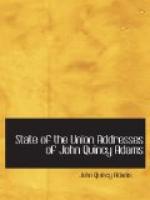The deep solicitude felt by our citizens of all classes throughout the Union for the total discharge of the public debt will apologize for the earnestness with which I deem it my duty to urge this topic upon the consideration of Congress—of recommending to them again the observance of the strictest economy in the application of the public funds. The depression upon the receipts of the revenue which had commenced with the year 1826 continued with increased severity during the two first quarters of the present year.
The returning tide began to flow with the third quarter, and, so far as we can judge from experience, may be expected to continue through the course of the ensuing year. In the mean time an alleviation from the burden of the public debt will in the three years have been effected to the amount of nearly $16,000,000, and the charge of annual interest will have been reduced upward of $1,000,000. But among the maxims of political economy which the stewards of the public moneys should never suffer without urgent necessity to be transcended is that of keeping the expenditures of the year within the limits of its receipts.
The appropriations of the two last years, including the yearly $10,000,000 of the sinking fund, have each equaled the promised revenue of the ensuing year. While we foresee with confidence that the public coffers will be replenished from the receipts as fast as they will be drained by the expenditures, equal in amount to those of the current year, it should not be forgotten that they could ill suffer the exhaustion of larger disbursements.
The condition of the Army and of all the branches of the public service under the superintendence of the Secretary of War will be seen by the report from that officer and the documents with which it is accompanied.
During the last summer a detachment of the Army has been usefully and successfully called to perform their appropriate duties. At the moment when the commissioners appointed for carrying into execution certain provisions of the treaty of August 19th, 1825, with various tribes of the North Western Indians were about to arrive at the appointed place of meeting the unprovoked murder of several citizens and other acts of unequivocal hostility committed by a party of the Winnebago tribe, one of those associated in the treaty, followed by indications of a menacing character among other tribes of the same region, rendered necessary an immediate display of the defensive and protective force of the Union in that quarter.
It was accordingly exhibited by the immediate and concerted movements of the governors of the State of Illinois and of the Territory of Michigan, and competent levies of militia, under their authority, with a corps of 700 men of United States troops, under the command of General Atkinson, who, at the call of Governor Cass, immediately repaired to the scene of danger from their station at St. Louis. Their presence dispelled the alarms of our fellow citizens on those disorders, and overawed the hostile purposes of the Indians. The perpetrators of the murders were surrendered to the authority and operation of our laws, and every appearance of purposed hostility from those Indian tribes has subsided.




